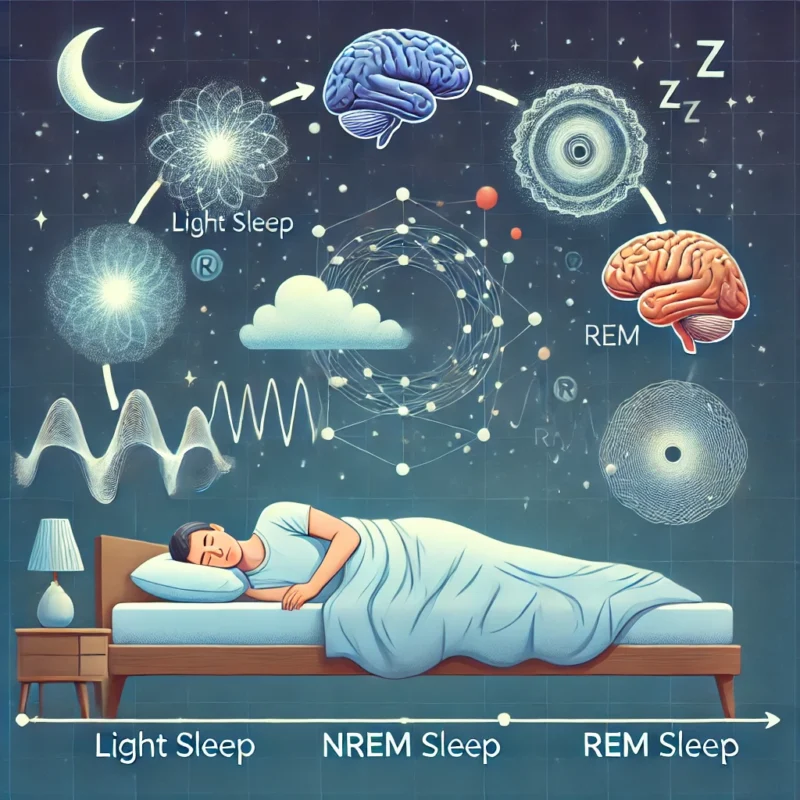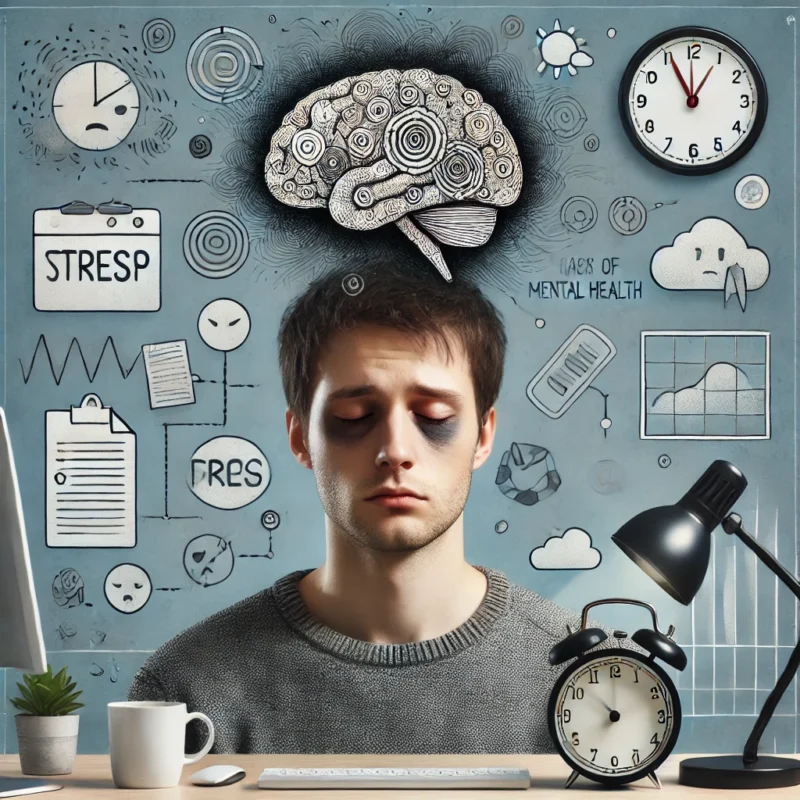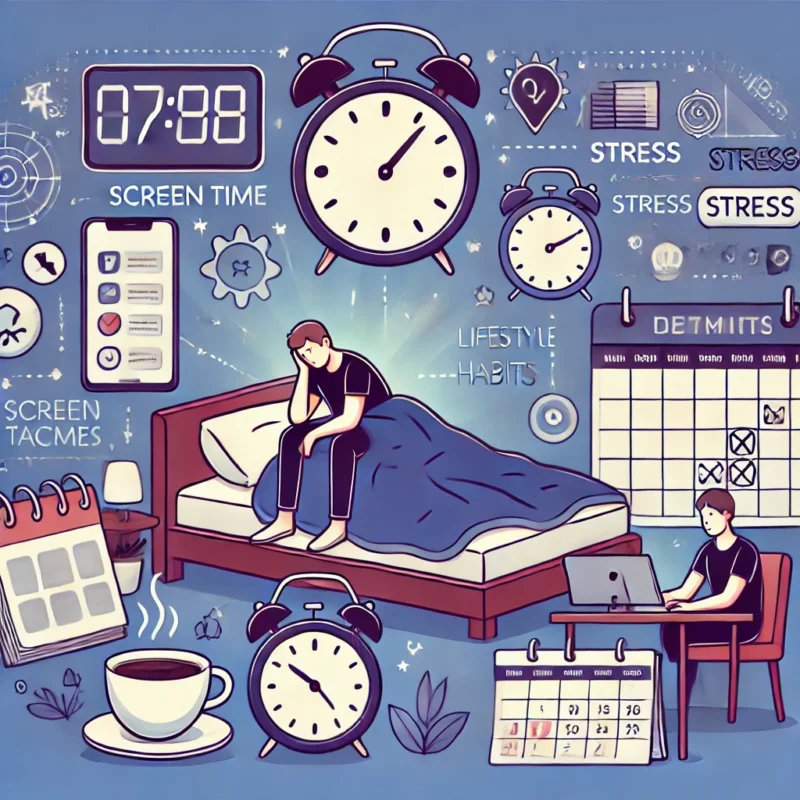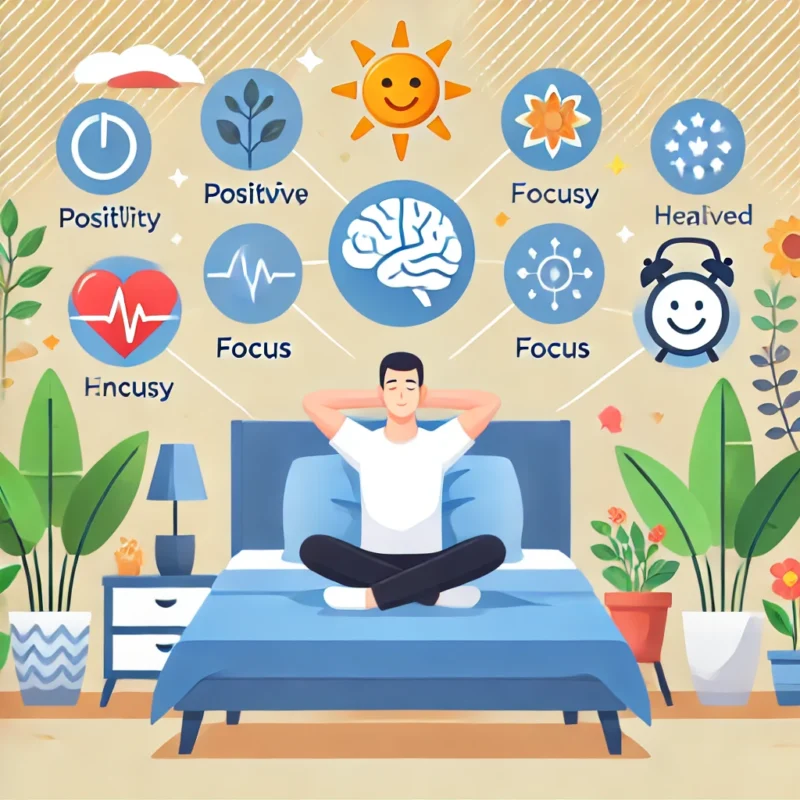In today’s world, where productivity is often prioritized over rest, sleep has become undervalued. However, research has shown that sleep is not only necessary for physical recovery but is also vital for mental well-being. The National Sleep Foundation recommends that adults aim for 7 to 9 hours of sleep per night to ensure optimal health. Yet, many people fall short of this recommendation, with over 35% of adults in the U.S. regularly sleeping less than 7 hours per night. This lack of sleep increases the risk of numerous mental health challenges, including stress, anxiety, and depression.
Sleep acts as a restorative process for the brain. During sleep, the brain consolidates memories, processes emotions, and prepares the body to handle the next day’s challenges. When sleep quality or duration is insufficient, people become more susceptible to mood swings, cognitive impairments, and increased emotional reactivity. In this article, we will explore how sleep affects mental health, the consequences of sleep deprivation, common causes of poor sleep, and evidence-based strategies to improve sleep and support mental well-being.
Table of Contents
1. The Stages of Sleep and Their Impact on Mental Health

Understanding the stages of sleep can provide insight into its impact on mental health. Sleep consists of two main categories: NREM (Non-Rapid Eye Movement) and REM (Rapid Eye Movement). Each stage contributes uniquely to cognitive functioning, emotional resilience, and psychological recovery.
NREM Sleep: Foundation for Physical and Mental Restoration
NREM sleep is often considered the most restorative type of sleep and is divided into three distinct stages:
- Stage 1: This light sleep stage is a transitional period between wakefulness and deeper sleep. Lasting only a few minutes, this stage is critical for helping the body begin to relax. Muscle activity slows, and brain waves begin to decelerate, preparing the body for deeper sleep.
- Stage 2: As individuals enter this stage, body temperature drops, breathing and heart rates begin to stabilize, and eye movements cease. This stage accounts for roughly 45-55% of total sleep and plays a crucial role in enabling the body to conserve energy and relax.
- Stage 3: Often referred to as “deep sleep” or “slow-wave sleep,” this stage is essential for physical and mental restoration. Growth hormones are released, aiding in muscle repair, tissue growth, and immune function strengthening. During deep sleep, the brain also processes and organizes memories from the day, a critical aspect for mental health.
REM Sleep: Essential for Emotional Processing and Cognitive Function
REM sleep is the stage associated with dreaming and heightened brain activity. During REM sleep, the brain becomes as active as it is during wakefulness, while the body remains paralyzed to prevent us from acting out dreams. REM sleep comprises approximately 20-25% of total sleep and is critical for emotional regulation, memory consolidation, and mood stabilization.
Studies indicate that REM sleep plays a pivotal role in helping individuals manage emotions. This stage of sleep allows the brain to process and store emotional memories, enabling individuals to handle stressful situations with a balanced perspective. A lack of REM sleep is associated with increased stress sensitivity and irritability, which can compromise personal and professional relationships.
Research conducted by the University of California, Berkeley, found that individuals who experienced reduced REM sleep were more likely to have difficulty coping with stressors and displayed increased sensitivity to negative stimuli. This underscores the importance of REM sleep for maintaining mental resilience and a positive outlook.
2. The Consequences of Sleep Deprivation on Mental Health

The negative effects of sleep deprivation on mental health are extensive, affecting mood, cognitive function, and overall psychological well-being.
Higher Risk of Anxiety and Depression
One of the most well-documented consequences of sleep deprivation is its impact on mood disorders, particularly anxiety and depression. A study conducted by the American Academy of Sleep Medicine found that individuals who slept less than six hours per night were significantly more likely to experience symptoms of anxiety and depression compared to those who received adequate sleep. When people are sleep-deprived, their brain’s ability to regulate emotions diminishes, increasing the risk of mood disorders.
Sleep deprivation affects neurotransmitter levels, particularly serotonin and dopamine, which play a vital role in regulating mood. Chronic sleep deprivation can create a feedback loop with depression, as lack of sleep exacerbates depressive symptoms, while depression itself often disrupts sleep. This cycle can be challenging to break, making sleep an important focus for mental health treatments.
Impaired Cognitive Abilities and Decline in Productivity
Sleep plays a critical role in cognitive functions such as memory, learning, and decision-making. The hippocampus, a region of the brain associated with memory formation, is particularly affected by sleep deprivation. People who are sleep-deprived struggle to concentrate, recall information, and make informed decisions.
In the workplace, sleep-deprived employees may experience slower reaction times, lower accuracy, and reduced creativity. This decline in productivity can lead to increased stress and frustration, perpetuating a cycle of poor performance and mental strain. Moreover, cognitive impairments caused by sleep deprivation extend into personal life, impacting decision-making, social interactions, and overall life satisfaction.
Increased Emotional Reactivity and Irritability
Lack of sleep can lead to heightened emotional reactivity. Research shows that sleep-deprived individuals are more likely to overreact to minor setbacks and display irritability. This is due to increased activity in the amygdala, the brain’s emotional processing center, which becomes hyperactive when sleep is compromised. Additionally, sleep deprivation reduces the activity of the prefrontal cortex, the brain region responsible for impulse control and rational decision-making.
In personal relationships, sleep-deprived individuals are more likely to misinterpret others’ intentions, respond negatively to minor conflicts, and find it challenging to communicate effectively. Over time, this emotional instability can erode trust and cause friction in social interactions, making it vital to prioritize sleep for maintaining healthy relationships.
3. Common Causes of Sleep Deprivation and Their Impact on Mental Health

Understanding the causes of sleep deprivation is essential for addressing and improving sleep quality. Factors such as lifestyle choices, stress, and underlying medical conditions can all contribute to poor sleep quality.
Lifestyle Choices and Poor Sleep Hygiene
Lifestyle factors like excessive screen time, irregular sleep schedules, and stimulant consumption disrupt the body’s natural sleep-wake cycle. The blue light emitted from screens, particularly when using electronic devices before bed, can interfere with melatonin production, making it harder to fall asleep. Research from Harvard Medical School found that blue light exposure suppresses melatonin for about twice as long as other types of light, delaying the onset of sleep.
Additionally, caffeine and alcohol consumption can disrupt sleep. Caffeine, found in coffee, tea, and energy drinks, can remain in the body for several hours, making it difficult to relax before bed. Alcohol, while sedative initially, disrupts REM sleep and leads to fragmented sleep patterns, which results in less restorative rest.
Stress and Anxiety as Sleep Disruptors
Stress and anxiety are some of the most common contributors to sleep problems. The body’s stress response triggers the release of cortisol, a hormone that promotes wakefulness. Chronic stress keeps cortisol levels elevated, disrupting the natural sleep-wake cycle and making it challenging for individuals to relax at night.
Anxiety, particularly when it manifests as racing thoughts or worry, can create a cycle of sleeplessness that worsens mental health. For people with generalized anxiety disorder (GAD) or other anxiety-related conditions, insomnia and poor sleep quality are often constant issues. Research shows that people with anxiety disorders are 60% more likely to experience insomnia compared to the general population, highlighting the intricate link between stress, anxiety, and sleep.
Medical Conditions and Sleep Disorders
Various medical conditions and sleep disorders, such as insomnia, sleep apnea, and circadian rhythm disorders, can severely impact sleep quality. Insomnia, characterized by difficulty falling or staying asleep, affects around 10% of adults and is often linked with mental health issues. Insomniacs frequently report daytime fatigue, irritability, and cognitive impairments.
Sleep apnea, a disorder where breathing repeatedly stops and starts during sleep, leads to frequent awakenings and reduced sleep quality. Circadian rhythm disorders, such as delayed sleep phase disorder, disrupt the body’s internal clock, causing individuals to feel alert at night and sleepy during the day. These disorders often require treatment or lifestyle adjustments to improve sleep quality and reduce the mental health consequences associated with chronic sleep disruption.
4. The Benefits of Quality Sleep for Mental Health

The benefits of quality sleep extend beyond physical health, significantly enhancing emotional resilience, cognitive function, and the ability to cope with stress.
Enhanced Memory and Cognitive Performance
Sleep is essential for memory consolidation, which takes place during both deep NREM and REM stages. Research from the National Institutes of Health shows that individuals who sleep well are better able to retain information, perform cognitive tasks, and maintain high levels of creativity. Memory consolidation during sleep helps the brain organize and store information, allowing individuals to process information more efficiently during the day.
Improved Emotional Regulation and Stress Management
REM sleep plays a crucial role in emotional regulation, allowing the brain to process and store emotional memories. Individuals who receive sufficient REM sleep are better able to manage stress, respond to challenging situations calmly, and maintain positive relationships. This emotional stability is particularly valuable in high-stress environments, such as the workplace, where calmness and composure can enhance productivity and job satisfaction.
Increased Resilience to Mental Health Disorders
Quality sleep supports resilience against mental health disorders, such as anxiety and depression. A well-rested mind is more likely to manage stress effectively, preventing the onset of mood disorders. Studies show that individuals with consistent, high-quality sleep are less likely to experience mental health conditions, making sleep a crucial factor in preventive mental health care.
5. Strategies for Improving Sleep Quality to Support Mental Health

There are various effective strategies to improve sleep quality and enhance mental health. Developing a regular sleep routine and adopting healthy sleep habits can promote better rest and emotional stability.
Establish a Consistent Sleep Schedule
Setting a regular sleep schedule helps synchronize the body’s internal clock. Going to bed and waking up at the same time every day can improve sleep quality, making it easier to fall asleep and wake up refreshed. Research shows that individuals with consistent sleep patterns report higher sleep quality and improved mental health outcomes.
Minimize Blue Light Exposure and Limit Screen Time Before Bed
Reducing exposure to blue light from electronic devices at least an hour before bedtime can help improve sleep quality. Engaging in calming activities, such as reading a book, meditating, or listening to soft music, can signal the brain to wind down.
Practice Relaxation Techniques for Better Sleep
Relaxation techniques like meditation, deep breathing, and yoga can reduce stress and anxiety, preparing the mind and body for restful sleep. A study published in Mindfulness found that individuals who practiced meditation before bed reported significant improvements in sleep quality and overall mental well-being.
Optimize the Sleep Environment
Creating a sleep-conducive environment—quiet, dark, and cool—can enhance sleep quality. Investing in a supportive mattress and pillow, using blackout curtains, and minimizing noise are simple yet effective ways to create a comfortable sleep environment that supports rest.
Limit Stimulants and Heavy Meals Before Bed
Avoiding stimulants, such as caffeine and nicotine, in the late afternoon and evening helps prevent sleep disruptions. Additionally, large meals close to bedtime can cause discomfort and interfere with the body’s ability to relax. Instead, opt for a light snack if needed to avoid going to bed hungry.
Conclusion: Building Healthy Sleep Habits for Long-Term Mental Health
Sleep is fundamental to mental well-being. By prioritizing quality sleep, individuals can enhance their emotional resilience, cognitive abilities, and ability to cope with stress. In a society that often values productivity over rest, committing to healthy sleep habits may seem challenging, but the benefits for mental health are profound.
Creating a consistent sleep routine, practicing relaxation techniques, and optimizing the sleep environment can all contribute to better mental health and quality of life. By investing in sleep, we lay the foundation for a happier, healthier, and more resilient self, enabling us to face life’s challenges with strength and clarity.
